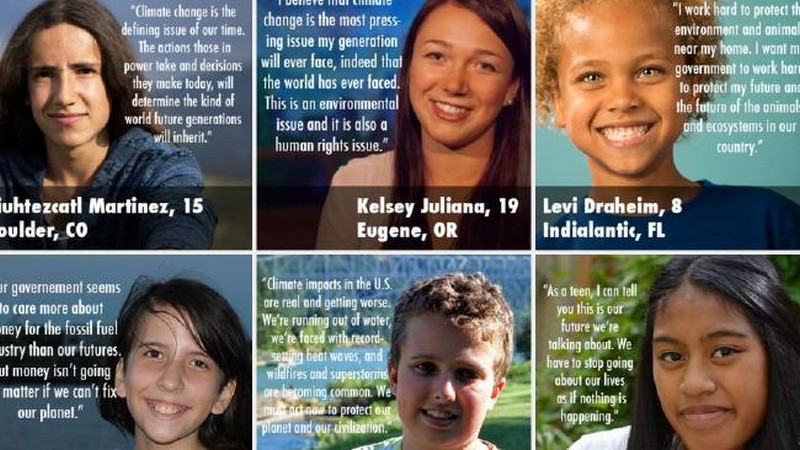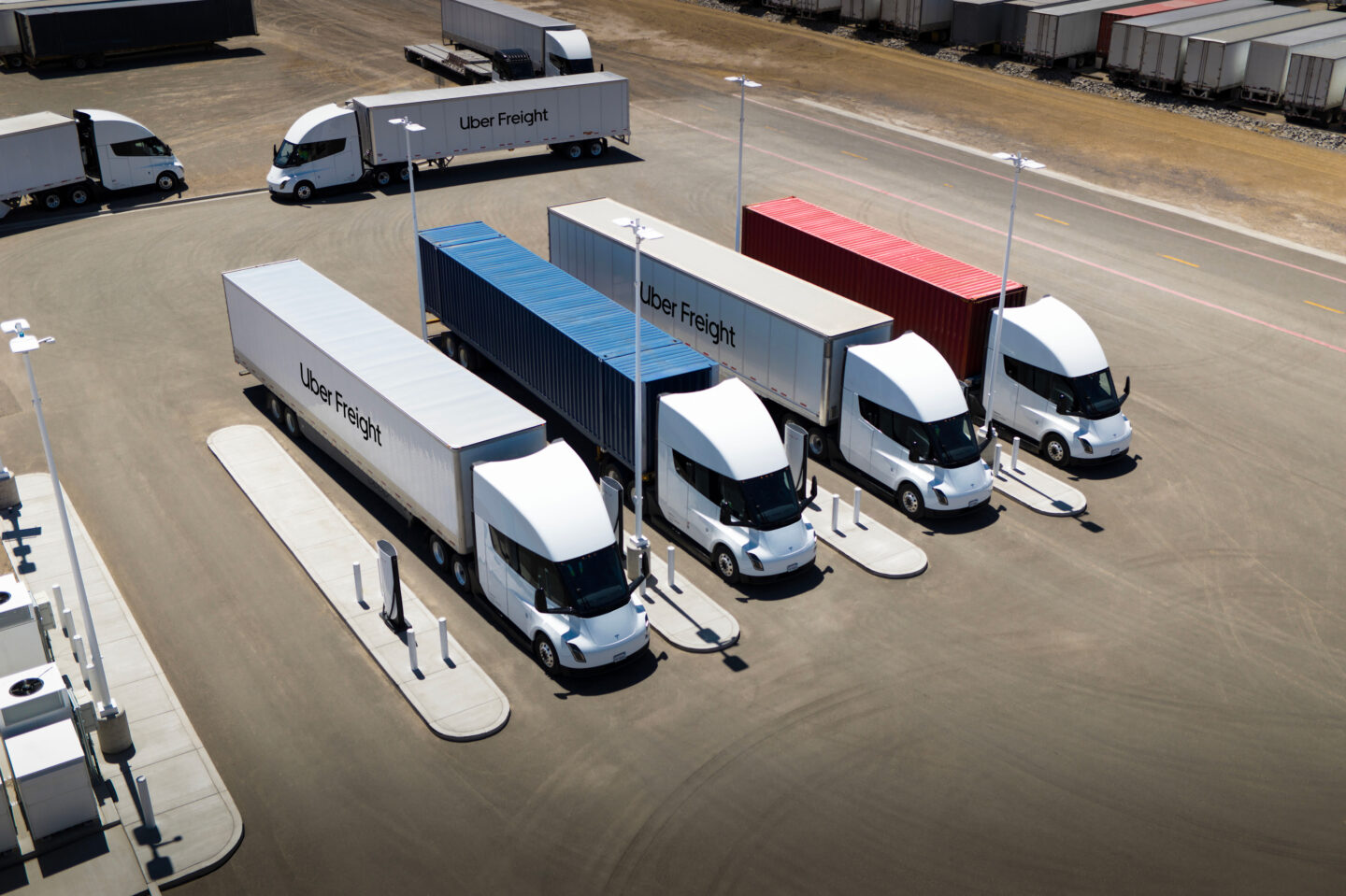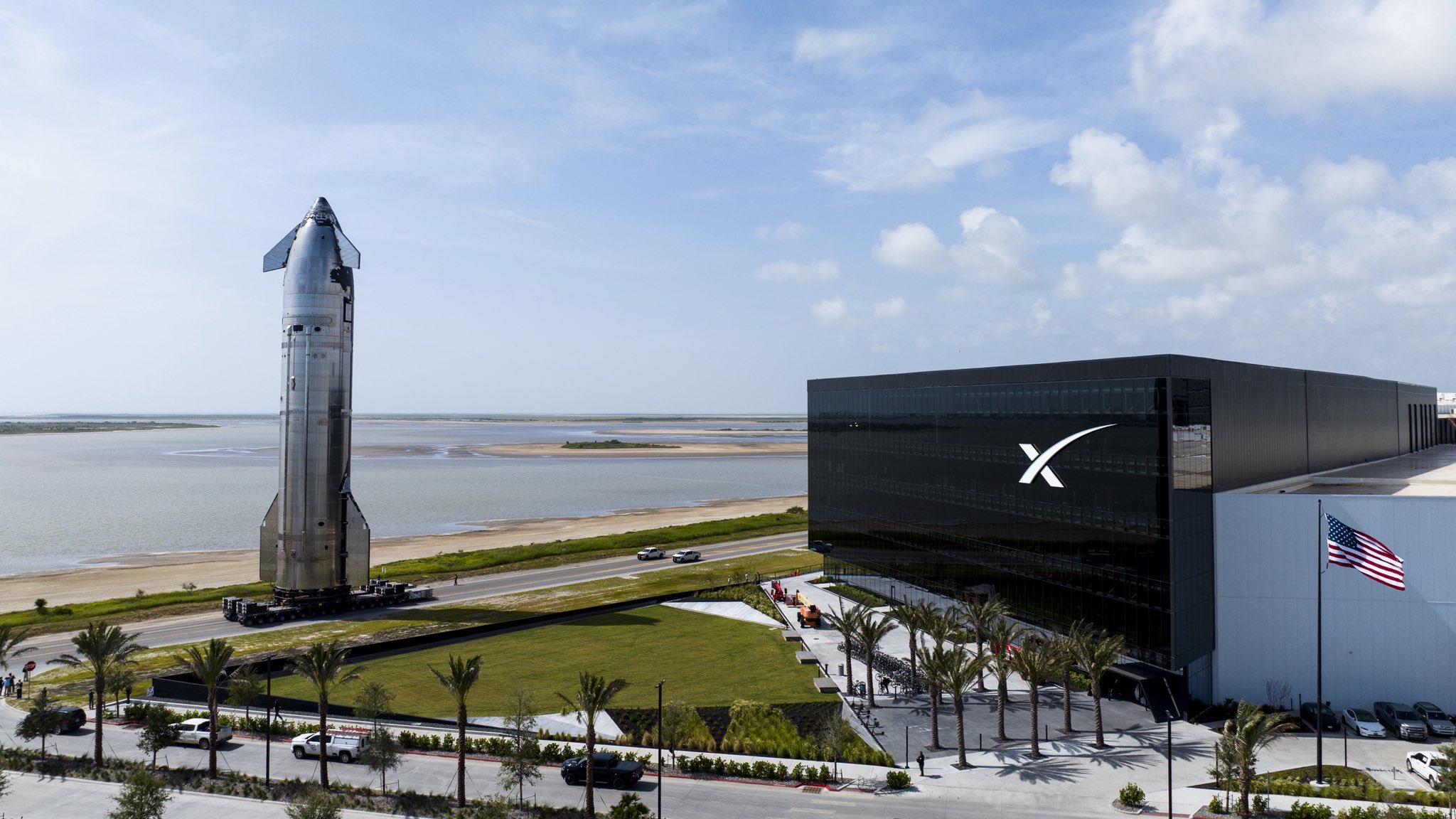News
Federal Court Rules: Youth’s Climate Change Suit May Proceed

What does a federal climate change law suit brought by young people against the United States government have to do with Elon Musk and Tesla Motors? On the surface, the answer is nothing. But dig a little deeper and you will see these kids are promoting the same philosophy that drives Tesla — a desire to rid the world of the scourge of fossil fuels.

21 young people between the ages of 8 and 19 have sued the federal government for failing to protect them from the dangers of climate change. Photo credit: The Guardian
The plaintiffs in the suit are 21 young people ranging in age from 8 to 19. They are joined by climate activist Dr. James Hansen. The suit claims the federal government is violating their rights as guaranteed by the Constitution to life, liberty, and property. It says the government is permitting, encouraging, and otherwise enabling continued exploitation, production, and combustion of fossil fuels.
Lawyers for various fossil fuel interests filed motions to dismiss the suit on several technical grounds. They claim the plaintiffs have not suffered any harm personally. They also claim the suit raises political questions that are not the proper province of the courts.
On April 8, U.S. Magistrate Judge Thomas Coffin of the federal District Court in Eugene, Oregon denied the defense motions and ruled that the suit, Juliana vs. United States, may proceed. He characterized the case as an “unprecedented lawsuit” addressing “government action and inaction” resulting “in carbon pollution of the atmosphere, climate destabilization, and ocean acidification.”
In his decision, Judge Coffin wrote: “The debate about climate change and its impact has been before various political bodies for some time now. Plaintiffs give this debate justiciability by asserting harms that befall or will befall them personally and to a greater extent than older segments of society.”
The judge continued, “It may be that eventually the alleged harms, assuming the correctness of plaintiffs’ analysis of the impacts of global climate change, will befall all of us. But the intractability of the debates before Congress and state legislatures and the alleged valuing of short term economic interest despite the cost to human life, necessitates a need for the courts to evaluate the constitutional parameters of the action or inaction taken by the government. This is especially true when such harms have an alleged disparate impact on a discrete class of society.”
Plaintiffs’ attorney Philip Gregory tells the press, “This decision is one of the most significant in our nation’s history. The Court upheld our claims that the federal government intensified the danger to our plaintiffs’ lives, liberty and property. Judge Coffin decided our complaint will move forward and put climate science squarely in front of the federal courts. The next step is for the Court to order our government to cease jeopardizing the climate system for present and future generations. The Court gave America’s youth a fair opportunity to be heard.”
This is only a preliminary step in what could be a long and torturous legal process that eventually could wind up before the US Supreme Court. Rest assured that the fossil fuel industry and the conservative groups they underwrite will marshal their enormous resources to fight the case every step of the way.
The suit is not without precedent, however. A legal action in the Netherlands last year got the court to order the government to cut emissions more quickly. A lawsuit against the state of Washington in 2011 resulted in the state government being ordered to re-examine its plans to reduce greenhouse gas emissions. Eventually Governor Jay Inslee directed regulators to cap emissions and curb them by 50 per cent by 2050.
When we compare the remarks Elon Musk made at the COP21 conference in Paris last December with the claims made by these young plaintiffs, it is clear they are closely aligned. Perhaps America needs to pay more attention to its children and less time listening to the climate deniers in Congress who are willing to sell out their constituents for 30 pieces of silver.
Source: Our Children’s Trust

News
Tesla adds a new feature to Navigation in preparation for a new vehicle
After CEO Elon Musk announced earlier this week that the Semi’s mass production processes were scheduled for later this year, the company has been making various preparations as it nears manufacturing.

Tesla has added a new feature to its Navigation and Supercharger Map in preparation for a new vehicle to hit the road: the Semi.
After CEO Elon Musk announced earlier this week that the Semi’s mass production processes were scheduled for later this year, the company has been making various preparations as it nears manufacturing.
Elon Musk confirms Tesla Semi will enter high-volume production this year
One of those changes has been the newly-released information regarding trim levels, as well as reports that Tesla has started to reach out to customers regarding pricing information for those trims.
Now, Tesla has made an additional bit of information available to the public in the form of locations of Megachargers, the infrastructure that will be responsible for charging the Semi and other all-electric Class 8 vehicles that hit the road.
Tesla made the announcement on the social media platform X:
We put Semi Megachargers on the map
→ https://t.co/Jb6p7OPXMi pic.twitter.com/stwYwtDVSB
— Tesla Semi (@tesla_semi) February 10, 2026
Although it is a minor development, it is a major indication that Tesla is preparing for the Semi to head toward mass production, something the company has been hinting at for several years.
Nevertheless, this, along with the other information that was released this week, points toward a significant stride in Tesla’s progress in the Semi project.
Now that the company has also worked toward completion of the dedicated manufacturing plant in Sparks, Nevada, there are more signs than ever that the vehicle is finally ready to be built and delivered to customers outside of the pilot program that has been in operation for several years.
For now, the Megachargers are going to be situated on the West Coast, with a heavy emphasis on routes like I-5 and I-10. This strategy prioritizes major highways and logistics hubs where freight traffic is heaviest, ensuring coverage for both cross-country and regional hauls.
California and Texas are slated to have the most initially, with 17 and 19 sites, respectively. As the program continues to grow, Florida, Georgia, Illinois, Washington, New York, and Nevada will have Megacharger locations as well.
For now, the Megachargers are available in Lathrop, California, and Sparks, Nevada, both of which have ties to Tesla. The former is the location of the Megafactory, and Sparks is where both the Tesla Gigafactory and Semifactory are located.
Elon Musk
Tesla stock gets latest synopsis from Jim Cramer: ‘It’s actually a robotics company’
“Turns out it’s actually a robotics and Cybercab company, and I want to buy, buy, buy. Yes, Tesla’s the paper that turned into scissors in one session,” Cramer said.

Tesla stock (NASDAQ: TSLA) got its latest synopsis from Wall Street analyst Jim Cramer, who finally realized something that many fans of the company have known all along: it’s not a car company. Instead, it’s a robotics company.
In a recent note that was released after Tesla reported Earnings in late January, Cramer seemed to recognize that the underwhelming financials and overall performance of the automotive division were not representative of the current state of affairs.
Instead, we’re seeing a company transition itself away from its early identity, essentially evolving like a caterpillar into a butterfly.
The narrative of the Earnings Call was simple: We’re not a car company, at least not from a birds-eye view. We’re an AI and Robotics company, and we are transitioning to this quicker than most people realize.
Tesla stock gets another analysis from Jim Cramer, and investors will like it
Tesla’s Q4 Earnings Call featured plenty of analysis from CEO Elon Musk and others, and some of the more minor details of the call were even indicative of a company that is moving toward AI instead of its cars. For example, the Model S and Model X will be no more after Q2, as Musk said that they serve relatively no purpose for the future.
Instead, Tesla is shifting its focus to the vehicles catered for autonomy and its Robotaxi and self-driving efforts.
Cramer recognizes this:
“…we got results from Tesla, which actually beat numbers, but nobody cares about the numbers here, as electric vehicles are the past. And according to CEO Elon Musk, the future of this company comes down to Cybercabs and humanoid robots. Stock fell more than 3% the next day. That may be because their capital expenditures budget was higher than expected, or maybe people wanted more details from the new businesses. At this point, I think Musk acolytes might be more excited about SpaceX, which is planning to come public later this year.”
He continued, highlighting the company’s true transition away from vehicles to its Cybercab, Optimus, and AI ambitions:
“I know it’s hard to believe how quickly this market can change its attitude. Last night, I heard a disastrous car company speak. Turns out it’s actually a robotics and Cybercab company, and I want to buy, buy, buy. Yes, Tesla’s the paper that turned into scissors in one session. I didn’t like it as a car company. Boy, I love it as a Cybercab and humanoid robot juggernaut. Call me a buyer and give me five robots while I’m at it.”
Cramer’s narrative seems to fit that of the most bullish Tesla investors. Anyone who is labeled a “permabull” has been echoing a similar sentiment over the past several years: Tesla is not a car company any longer.
Instead, the true focus is on the future and the potential that AI and Robotics bring to the company. It is truly difficult to put Tesla shares in the same group as companies like Ford, General Motors, and others.
Tesla shares are down less than half a percent at the time of publishing, trading at $423.69.
Elon Musk
SpaceX secures win as US labor board drops oversight case
The NLRB confirmed that it no longer has jurisdiction over SpaceX.

SpaceX scored a legal victory after the National Labor Relations Board (NLRB) decided to dismiss a case which accused the company of terminating engineers who were involved in an open letter against founder Elon Musk.
The NLRB confirmed that it no longer has jurisdiction over SpaceX. The update was initially shared by Bloomberg News, which cited a letter about the matter it reportedly reviewed.
In a letter to the former employees’ lawyers, the labor board stated that the affected employees were under the jurisdiction of the National Mediation Board (NMB), not the NLRB. As a result, the labor board stated that it was dismissing the case.
As per Danielle Pierce, a regional director of the agency, “the National Labor Relations Board lacks jurisdiction over the Employer and, therefore, I am dismissing your charge.”
The NMB typically oversees airlines and railroads. The NLRB, on the other hand, covers most private-sector employers, as well as manufacturers such as Boeing.
The former SpaceX engineers have argued that the private space company did not belong under the NMB’s jurisdiction because SpaceX only offers services to “hand-picked customers.”
In an opinion, however, the NMB stated that SpaceX was under its jurisdiction because “space transport includes air travel” to get to outer space. The mediation board also noted that anyone can contact SpaceX to secure its services.
SpaceX had previously challenged the NLRB’s authority in court, arguing that the agency’s structure was unconstitutional. Jennifer Abruzzo, the NLRB general counsel under former United States President Joe Biden, rejected SpaceX’s claims. Following Abruzzo’s termination under the Trump administration, however, SpaceX asked the labor board to reconsider its arguments.
SpaceX is not the only company that has challenged the constitutionality of the NLRB. Since SpaceX filed its legal challenge against the agency in 2024, other high-profile companies have followed suit. These include Amazon, which has filed similar cases that are now pending.








